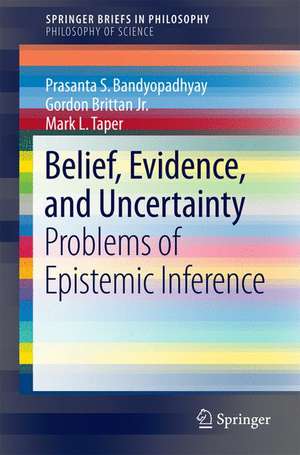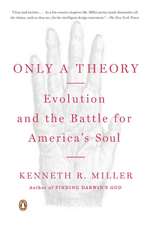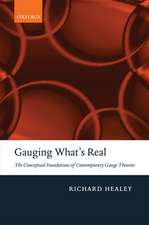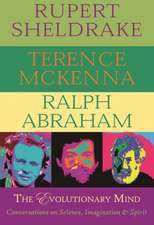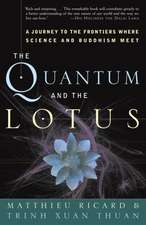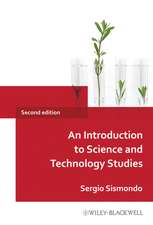Belief, Evidence, and Uncertainty: Problems of Epistemic Inference: SpringerBriefs in Philosophy
Autor Prasanta S. Bandyopadhyay, Gordon Brittan Jr., Mark L. Taperen Limba Engleză Paperback – 14 mar 2016
This work breaks new ground by carefully distinguishing the concepts of belief, confirmation, and evidence and then integrating them into a better understanding of personal and scientific epistemologies. It outlines a probabilistic framework in which subjective features of personal knowledge and objective features of public knowledge have their true place. It also discusses the bearings of some statistical theorems on both formal and traditional epistemologies while showing how some of the existing paradoxes in both can be resolved with the help of this framework.
This book has two central aims: First, to make precise a distinction between the concepts of confirmation and evidence and to argue that failure to recognize this distinction is the source of certain otherwise intractable epistemological problems. The second goal is to demonstrate to philosophers the fundamental importance of statistical and probabilistic methods, at stake in the uncertain conditions in which for the most part we lead our lives, not simply to inferential practice in science, where they are now standard, but to epistemic inference in other contexts as well. Although the argument is rigorous, it is also accessible. No technical knowledge beyond the rudiments of probability theory, arithmetic, and algebra is presupposed, otherwise unfamiliar terms are always defined and a number of concrete examples are given. At the same time, fresh analyses are offered with a discussion of statistical and epistemic reasoning by philosophers. This book will also be of interest to scientists and statisticians looking for a larger view of their own inferential techniques.
The book concludes with a technical appendix which introduces an evidential approach to multi-model inference as an alternative to Bayesian model averaging.
Din seria SpringerBriefs in Philosophy
-
 Preț: 345.63 lei
Preț: 345.63 lei - 17%
 Preț: 359.61 lei
Preț: 359.61 lei -
 Preț: 345.91 lei
Preț: 345.91 lei -
 Preț: 378.54 lei
Preț: 378.54 lei -
 Preț: 348.79 lei
Preț: 348.79 lei -
 Preț: 376.59 lei
Preț: 376.59 lei -
 Preț: 377.73 lei
Preț: 377.73 lei -
 Preț: 411.54 lei
Preț: 411.54 lei - 15%
 Preț: 463.68 lei
Preț: 463.68 lei -
 Preț: 378.12 lei
Preț: 378.12 lei -
 Preț: 376.80 lei
Preț: 376.80 lei -
 Preț: 440.86 lei
Preț: 440.86 lei -
 Preț: 375.45 lei
Preț: 375.45 lei -
 Preț: 341.86 lei
Preț: 341.86 lei -
 Preț: 444.13 lei
Preț: 444.13 lei -
 Preț: 376.80 lei
Preț: 376.80 lei -
 Preț: 377.73 lei
Preț: 377.73 lei -
 Preț: 408.05 lei
Preț: 408.05 lei -
 Preț: 375.07 lei
Preț: 375.07 lei -
 Preț: 377.35 lei
Preț: 377.35 lei -
 Preț: 413.66 lei
Preț: 413.66 lei - 15%
 Preț: 463.85 lei
Preț: 463.85 lei -
 Preț: 380.84 lei
Preț: 380.84 lei -
 Preț: 376.59 lei
Preț: 376.59 lei -
 Preț: 376.22 lei
Preț: 376.22 lei -
 Preț: 376.80 lei
Preț: 376.80 lei -
 Preț: 349.10 lei
Preț: 349.10 lei -
 Preț: 348.79 lei
Preț: 348.79 lei -
 Preț: 377.18 lei
Preț: 377.18 lei -
 Preț: 132.39 lei
Preț: 132.39 lei -
 Preț: 380.25 lei
Preț: 380.25 lei -
 Preț: 380.25 lei
Preț: 380.25 lei - 15%
 Preț: 460.91 lei
Preț: 460.91 lei -
 Preț: 378.12 lei
Preț: 378.12 lei -
 Preț: 378.34 lei
Preț: 378.34 lei -
 Preț: 379.68 lei
Preț: 379.68 lei -
 Preț: 343.00 lei
Preț: 343.00 lei -
 Preț: 377.73 lei
Preț: 377.73 lei - 20%
 Preț: 321.52 lei
Preț: 321.52 lei -
 Preț: 343.33 lei
Preț: 343.33 lei - 15%
 Preț: 465.34 lei
Preț: 465.34 lei -
 Preț: 379.68 lei
Preț: 379.68 lei -
 Preț: 377.57 lei
Preț: 377.57 lei -
 Preț: 376.80 lei
Preț: 376.80 lei -
 Preț: 475.83 lei
Preț: 475.83 lei -
 Preț: 407.52 lei
Preț: 407.52 lei - 15%
 Preț: 461.73 lei
Preț: 461.73 lei -
 Preț: 345.63 lei
Preț: 345.63 lei -
 Preț: 379.86 lei
Preț: 379.86 lei
Preț: 481.79 lei
Nou
Puncte Express: 723
Preț estimativ în valută:
92.22€ • 100.20$ • 77.51£
92.22€ • 100.20$ • 77.51£
Carte tipărită la comandă
Livrare economică 21 aprilie-05 mai
Preluare comenzi: 021 569.72.76
Specificații
ISBN-13: 9783319277707
ISBN-10: 3319277707
Pagini: 183
Ilustrații: XIII, 178 p. 9 illus. in color.
Dimensiuni: 155 x 235 x 10 mm
Greutate: 0.28 kg
Ediția:1st ed. 2016
Editura: Springer International Publishing
Colecția Springer
Seriile SpringerBriefs in Philosophy, Philosophy of Science
Locul publicării:Cham, Switzerland
ISBN-10: 3319277707
Pagini: 183
Ilustrații: XIII, 178 p. 9 illus. in color.
Dimensiuni: 155 x 235 x 10 mm
Greutate: 0.28 kg
Ediția:1st ed. 2016
Editura: Springer International Publishing
Colecția Springer
Seriile SpringerBriefs in Philosophy, Philosophy of Science
Locul publicării:Cham, Switzerland
Public țintă
ResearchCuprins
Chapter 1. Introduction.- Chapter 2. Confirmation and Evidence.- Chapter 3. Confirmation, Evidence and Inference.- Chapter 4. Subjective Bayesian Accounts of Evidence.- Chapter 5. Mapping the Concept of Misleading Evidence.- Chapter 6. Non-Bayesian Accounts of Evidence.- Chapter 7. Error-Statistics and Severe Testing.- Chapter 8. Confirmation/Evidence Epistemology and Resolution of Paradoxes.- Chapter 9. Concluding Remarks.
Notă biografică
Prasanta S. Bandyopadhyay specializes in philosophy of science with applications of probability and statistics in addressing some long-standing problems in scientific inference. Along with his co-authors, he has both developed and sharpened a partially subjective/objective Bayesian approach in epistemology of science. They have also proposed a logic-based account of Simpson’s paradox as an alternative to the well-entrenched causal accounts of the same. He was the only philosopher involved in NASA’s multidisciplinary origin of life research 6 million dollar grant (2007 July – 2012 June) for Montana State University. He co-edited with Malcolm, R. Forster the Handbook of Philosophy of Statistics volume (Elsevier, 2011). He was an invited speaker for the International Conference on Bayesian Statistics held in Varanasi, India in 2013. He is currently editing a Newsletter for the American Philosophical Associations’ Asian Americans on “Indian Philosophy and Culture” due to come out in Feb, 2015.
Gordon Brittan, Jr.’s workfocuses on philosophy of science and mathematics, with special reference to the17th and 18th centuries and the application of free-logical, statistical andprobabilistic methods to the solution of traditional and contemporarymethodological and epistemological problems. With Karel Lambert, he authored An Introduction to the Philosophy of Science,which has appeared in four editions and been translated eight times. He is alsothe author of Kant’s Theory of Science(Princeton University Press, 1978) and the editor of Causality, Method, and Modality: Essays in Honor of Jules Vuillemin(Kluwer Academic Publishers, 1991).
Mark L. Taper’s research involves statistical and quantitative modelling, both analytic and computational, to answer questions in conservation biology, population dynamics, conservation genetics, evolutionary ecology, community ecology, population genetics, spatial ecology, and macro ecology. He is deeply concerned with effectively connecting ecological and evolutionary theory with the real world. This has led him to work on the construction of statistical methodologies appropriate to ecological and evolutionary problems and to an interest in the epistemological foundations of both statistics and science. He co-edited with Subhash Lele, The Nature of Scientific Evidence: Scientific, Philosophical, and Empirical Considerations (University of Chicago Press, 2004).
Caracteristici
Breaks new ground in building personal and scientific epistemology using the principles of belief, confirmation, and evidence Makes precise a distinction between the concepts of confirmation and evidence and analyzes the importance of such a distinction Discusses the bearings of some statistical theorems on both formal and traditional epistemologies Includes supplementary material: sn.pub/extras
